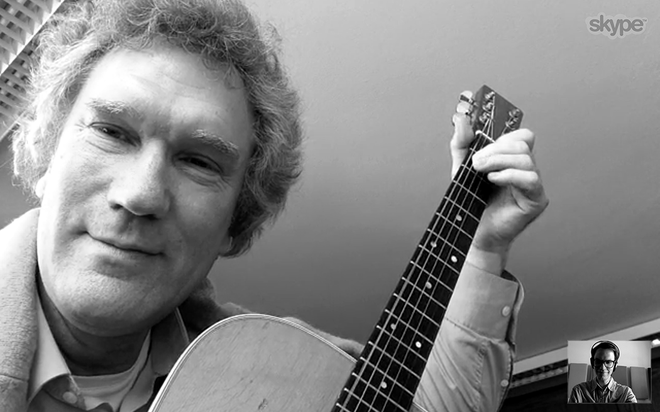Master of the Pop Formulas
Pop music is Volkmar Kramarz’s passion. And the Eurovision Song Contest is his area of expertise. In our interview via Skype the Bonn-based musicologist and master of the “Pop Formulas” reveals why the show represents a wonderful field test and who he thinks will win it in all likelihood. Kramarz also doesn’t hold back with one or the other scientific analyses on the guitar – have a listen yourself!
Matthias Heschl: You are considered a Song Contest expert and a reliable source for making wagers. Do you use your expertise now and then to make money yourself?
Volkmar Kramarz: (laughs) Predicting number one is a bit difficult because with very comparable songs sometimes things like Lordi or Conchita Wurst can happen right at the end. It is relatively easy to say who will be among the first three or five.
"For me the Song Contest is wonderful field test"
… and you can also bet on that?
Yes, I always put down one, two Euros with my students, and I always pick up the money afterwards as well.
Sounds like a good side job.
More like a small collateral damage. (laughs)
Pop music is a main subject in your research. What does the Song Contest mean to you as a musicologist?
For me the Song Contest is wonderful field test. Where else do millions of people hear songs for the first time and spontaneously react within a few minutes? Namely with “I like!” or “I don’t like!”
"The sensation of the formulas is in us!"
And in most cases it totally supports your thesis of the so-called “Pop Formulas”. How does it go?
Even in pop music the great myth still prevails that every piece is a totally new discovery. You have the imagination that the musicians meditate under a big oak tree in summer and the sounds, melodies, and combinations fall on their laps. But in reality, it is always the same building blocks, modules, and formulas that make a pop song a success. It is interesting that practically all of the contributions to the Eurovision Song Contest are based on the same formulas – the more standardized and limited, the more successful they are.
Tell us the formula!
The sensation of the formulas is in us! For example, we experience A minor, F major, and G major simply as being quite pleasant. Why should we have something that satisfies us less? The art, however, is still to find something of your own within the guidelines.
In the meanwhile renowned producers often compose songs at the Eurovision Song Contest. Austria’s entry, for instance, was arranged by Jimmy Harry, who worked together with Madonna or Britney Spears, among others. Do these songwriters possess the required know-how more than someone who doesn’t know about the modules?
I can’t imagine that someone who is seriously active in this profession didn’t already suck up the formula with the “mother’s milk” of music. Nevertheless, every year you see attempts to add a shot of innovation, difference, and variation, so at least not all songs are tuned toward rapid worldwide success. But most of them stick close to the mark.
"The big advantage is actually not that the music is liked rather that the music doesn’t disturb"
Now the question of all questions: Who are the favorites in 2015?
Måns Zelmerlöw’s “Heroes” from Sweden! Here you can clearly hear how they float in this world of formulas, how meticulously they do it, and how mercilessly they use guitar samples – it’s really perfectly styled. It has less to do with lack of imagination and limitations, rather the artist knows how the recipients work and can offer them something within these guidelines. For me, this is already a highly artistic act. Do you have a second?
Sure!
Volkmar Kramarz disappears briefly out of the image and grabs his guitar to analyze the Austrian submission “I Am Yours” by The Makemakes.
The Belgian (Loïc Nottet, “Rhythm Inside”), Italian (Il Volo, “Grande Amore”), and Estonian (Elina Born & Stig Rästa, “Goodbye To Yesterday”) candidates are also quite interesting. Germany’s song (Ann Sophie, “Black Smoke”) is pretty slick, but almost too slick. But the Swedish submission “Heroes” soars above them all. When we make a count: “Heroes” has two times five bars and then two times four bars in the verse. Such tricks illustrate that one can still be creative within this strict corset. I could bow down with admiration.
But what comes across as highly artistic on the first listen is likely to quickly wear off?
If “Heroes” was blared to you for the 34th time, naturally
the effect is going to wear off a bit. But when you hear it for the
first time, beautifully delivered by the unshaven Swedish superstar, all
in all it has its own very special effect.
What roles do appearance, performance, and song text play?
This is a realm that others have surely researched better than I have. But in the end, it seems that the music is time and again the really important component. When the musical part of the song is appreciated the audience seems to buy the performance or the song text as well.
Apropos acceptance: Vienna is currently trying to profile itself as a cosmopolitan “city of acceptance and tolerance”. You’ve taught here in the city. How does this ring in your ears?
Despite all its pomp, Vienna is a very cheerful and liberal city. The positive attitude toward tourists can be felt everywhere, in my opinion. The success of a drag queen like Conchita Wurst speaks for itself. When I arrive in Vienna the first thing I do is buy a package of Manner wafers at Stephansplatz. Just like how others buy a bag of Haribo treats here in Bonn.


